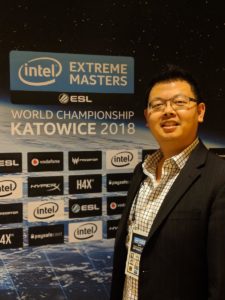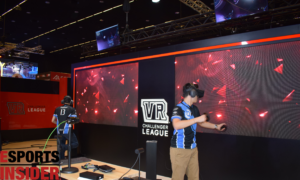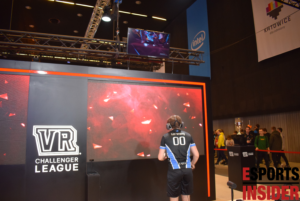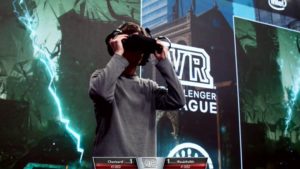This is following on from Part 1 of ESI in Katowice and the parallels drawn between relationship building and nurturing. This time, we turn our attention to virtual reality and its potential future in esports.

A couple of people that are no strangers to virtual reality are Jeff Clark, Global Director of Strategy and Planning in the VR, Esports and Gaming, Intel and Mark Chang, Global Head of Gaming and Esports Marketing Strategy, Intel. Both were keen to remind us of their drive to maintain Intel as leaders in gaming performance and hardware innovation, to expand the technology acceptance model by building the best place to play and position Intel for the future of gaming.
“We always want to be the first, the biggest and the best”
Clark noted: “We don’t want to be part of the noise. We need to be the premium experience by pushing the envelope and leadership. We do sponsor but we look at how we accelerate those businesses and partnerships. If we didn’t take the first step, we would be nowhere.”

Other topics ranged from a global secure internet, the powers of 5G, the capabilities of AI and the potential heightened viewing experiences that augmented reality and smart arenas can provide. Today we experience esports from the observer’s perspective, live in stadiums or from the comfort of our own choosing. Imagine, if you will, for one second what that would be like to combine both. Not just to use VR and AR for the sake of it, but chose where to spectate, from inside the game, or to see the action unfold on a projected AR stage. Or how about we finally put an end to the argument that esports are not a sport because there is no physical exercise involved by improving current VR usability and how it applies to esports?
An example of things to come were put on display with the VR Challenger League. VR gamers competed all over the world this year in places like Jönköping, Oakland, Hamburg and more on the Unspoken and Echo Arena making their way to the live finals at the Intel extreme masters.
We took the liberty to ask Tim Salvitti, Senior Community Developer, at Insomniac games and Christopher Mckelvy, Commissioner of the VR Challenger League, about esports and their experience so far.
Esports Insider: How did all of this come about?
Tim Salvitti : We went to a couple of events and got a lot of players to play the game. They really liked the depth and strategy involved so we looked into our community and brought the top players together in a tournament with Intel, ESL, Microsoft and Oculus in 80 stores across the US. We realised after that tournament that we should be doing more of this and the VRCL kicked off from there.
ESI: What have you learned so far from your time in esports?
Tim: We learned to do beta/PTR tests, and that you can’t necessarily factor in the casual players. It’s tough because casual players are not going to understand this, but are they the audience right now? What is more important and can we do both?
ESI: What has the reception been like on the Unspoken tournament?

Tim: The players have been super competitive and really responsive.
I don’t think any of these players would have been traditional esports players but now they are the best of the best in VR esports. From a spectator perspective I always like to tell this story of when we were at Dreamhack in Austin. We had all these people cheering for this game, and probably half of them didn’t understand what they were watching, but seeing them out there cheering was super exciting. Wait until they actually understand the game and see how much more excited they get. It’s awesome to see that reaction, as people walk past, stop and watch and then they are getting into it.
ESI: How do you handle the instant feedback from the esports crowd?
Tim: So last year we updated the game almost every month,
“But then we learned that you don’t want to update it too much especially during tournaments”
It was all new to us, and we learned a tonne. I think if we had to rewind and do last year over again, we would have done some things differently. It’s all a learning experience for us. Our community is our lifeblood so taking their feedback and making sure that we also balance that against our designers has been a challenge, but it has been fun.
ESI: Can you tell us about how the ESL partnership came about?
Tim: Oculus and ESL were looking at what games could be esports titles and after ESL played the Unspoken they thought that this is the one that could have a future.
Being that we are so close to them in Burbank we got to hang out and talk to them and the rest just happened.
ESI: What is your wish for The Unspoken?
Tim: I want this tournament to go really well, for people to watch it, get excited, go home and try the game and VR out for themselves, because you never get the experience or VR without putting on the headset.
“It’s mind blowing at first but once you get used to it you start to realise the potential”
Esports Insider: Can you share with us your esports strategy?
Chris Mckelvy : We think VR is going to revolutionise esports. What does it mean to replace WASD with a step forward or right trigger with a swing of the hand? Competition wise, what does it mean with the physicality? Then spectatorship, how can we deliver immersive experiences and transport people to arenas, social co-presence, and viewing together as we work on the league?
ESI: Focus on partnerships for open leagues, or closed in-house leagues?

Chris: So this year we partnered with ESL and Intel, obvious partners in my opinion. Intel being the brand leader in esports and ESL knowing everything there is to know about running a league.
This year we did five events with two games but I think next year we’ll look to do more, whether that’s studio events, or live events, we’re working through it, but that’s kinda where we are headed.
ESI: Can you give us more information about VR and what it means to you?
Chris: It’s about social. VR is the most social platform ever made and esports gives us an awesome opportunity to show that off. Whether that’s competing on a team like in Echo arena, or spectating by putting on our headset, sitting on a virtual couch, watching Counter-Strike on our 90 inch TV.
With esports we have this awesome ability to show off that social experience.
The other part is about the games, developers and showing off these titles. Esports let us show our games as they are, immersive, AAA, high quality games. Echo arena is one of the most lauded PC games of 2017 not VR, PC games. It’s winning awards everywhere.
ESI: VR games are very immersive but how to you feel people receive it as a spectator sport?

Chris: Again I think we are going to revolutionise how people spectate. Ready at Dawn made an AI camera to follow the disk to make it easy to watch on a 2D screen. The Insomniac team created a 360 spectating function for one of our matches. You could put on a Samsung gear VR and be inside the arena watching the spells fly over your head. It’s relevant to all the games here. We’re looking to make that more immersive. What if you and me could put on a headset and get transported to the arena here with the crowd, looking at the avatars and enjoying that as a social experience. It’s relevant not just to VR games but for 2D games as well. I see that conversation will continue as esports grows.
ESI: Short term goals for Oculus?
Chris: We are currently working on what season two will look like. More games, more players, more spectators. We’ve created something that is entertainment for people.
“When you look at normal esports, most of the people who watch also play those games. When we look at the people who are watching our VR esports that’s not so much the case, and I think that the reason for that is the physicality”
They don’t have to understand Echo arena right away to be able to appreciate that, someone just jumped through the roof and that they are the best because he jumps so high and moves so quick. More events, is definitely what we are looking at too.
ESI: Any parting thoughts?
Chris: We’re still looking for our killer esports if you will, The Unspoken and Echo Arena are incredible and really powerful for what they are today. I think if I was to look forward five years down the line, I don’t know what that game is but obviously we want that. It would be great to have a huge portfolio, but what we are doing is searching for what makes sense as a great VR esport.
As the whole event came to a close it was clear just how much time, effort, money, dedication and creativity surrounds the esports and gaming space at large. From grassroots all the way up to the top of the pyramid. It is also undeniable that the likes of Intel, ESL, Oculus and more are supporting every aspect, present and future of the world of esports and the opportunities to scale are endless. If fans and businesses stay engaged then they might even have a say in what the future looks like. Intel are always looking for problems to solve with technology so as a group it’s key to keep the conversation open and free flowing as, individually we are great but together we are the greatest industry in the world.

